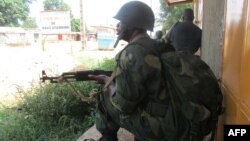GENEVA —
The International Committee of the Red Cross (ICRC) warns the humanitarian crisis in the Central African Republic will get worse without major efforts to restore security in this lawless country. A senior ICRC official says the lack of security keeps the population in a state of perpetual fear.
According to the ICRC, the people of Central African Republic are held hostage to pillaging, killings and sexual violence meted out by the warring factions.
Patrick L'Hote, the ICRC head of operations for Central and Southern Africa, who just returned from a four-day visit to the country, told VOA people live in a state of constant danger. Survival is their only mode of existence.
“What is going on now between the communities is very difficult and puts the people in a very difficult situation. They fear for their life," he explained. "They are put under a lot of pressure during the day, but also during the night. And, this takes place in a country, which was already before the events in a state of extreme poverty.”
L’Hote said this pervasive fear affects every aspect of society and hampers the ability to provide humanitarian aid. He said local health workers are under enormous pressure during the day while treating the sick and wounded.
“But, they also experience a difficult situation in their private life during the night when they are with their family - fearing for their life, for their belongings and sometimes forced to flee their home on a very short notice,” he noted.
The Red Cross was present in the country before this current war broke out at the end of 2012. That made it easy for the agency to move smoothly from a traditional to an emergency operation as the crisis grew.
The agency’s main focus is on the health sector. It has three surgical teams working around the clock at the Community Hospital in the capital, Bangui. It says around 70 percent of those receiving emergency care are victims of shootings or stabbings.
The ICRC also provides medical care in other parts of the country, such as the town of Kaga Bandoro and in Ndele in the north.
But, operations head L’Hote says the Red Cross's traditional role as neutral mediator between warring parties is difficult to perform in the C.A.R.
“You do not have two well defined groups fighting against each other. You have a combination of different factions, groups," L'Hote said. "Criminality also is rising up in the present days, so it has a real effect on the deterioration of the situation.”
L’Hote said impunity in the country is widespread. He said people feel they can do whatever they want and will not have to pay a price for their actions.
According to the ICRC, the people of Central African Republic are held hostage to pillaging, killings and sexual violence meted out by the warring factions.
Patrick L'Hote, the ICRC head of operations for Central and Southern Africa, who just returned from a four-day visit to the country, told VOA people live in a state of constant danger. Survival is their only mode of existence.
“What is going on now between the communities is very difficult and puts the people in a very difficult situation. They fear for their life," he explained. "They are put under a lot of pressure during the day, but also during the night. And, this takes place in a country, which was already before the events in a state of extreme poverty.”
L’Hote said this pervasive fear affects every aspect of society and hampers the ability to provide humanitarian aid. He said local health workers are under enormous pressure during the day while treating the sick and wounded.
“But, they also experience a difficult situation in their private life during the night when they are with their family - fearing for their life, for their belongings and sometimes forced to flee their home on a very short notice,” he noted.
The Red Cross was present in the country before this current war broke out at the end of 2012. That made it easy for the agency to move smoothly from a traditional to an emergency operation as the crisis grew.
The agency’s main focus is on the health sector. It has three surgical teams working around the clock at the Community Hospital in the capital, Bangui. It says around 70 percent of those receiving emergency care are victims of shootings or stabbings.
The ICRC also provides medical care in other parts of the country, such as the town of Kaga Bandoro and in Ndele in the north.
But, operations head L’Hote says the Red Cross's traditional role as neutral mediator between warring parties is difficult to perform in the C.A.R.
“You do not have two well defined groups fighting against each other. You have a combination of different factions, groups," L'Hote said. "Criminality also is rising up in the present days, so it has a real effect on the deterioration of the situation.”
L’Hote said impunity in the country is widespread. He said people feel they can do whatever they want and will not have to pay a price for their actions.




